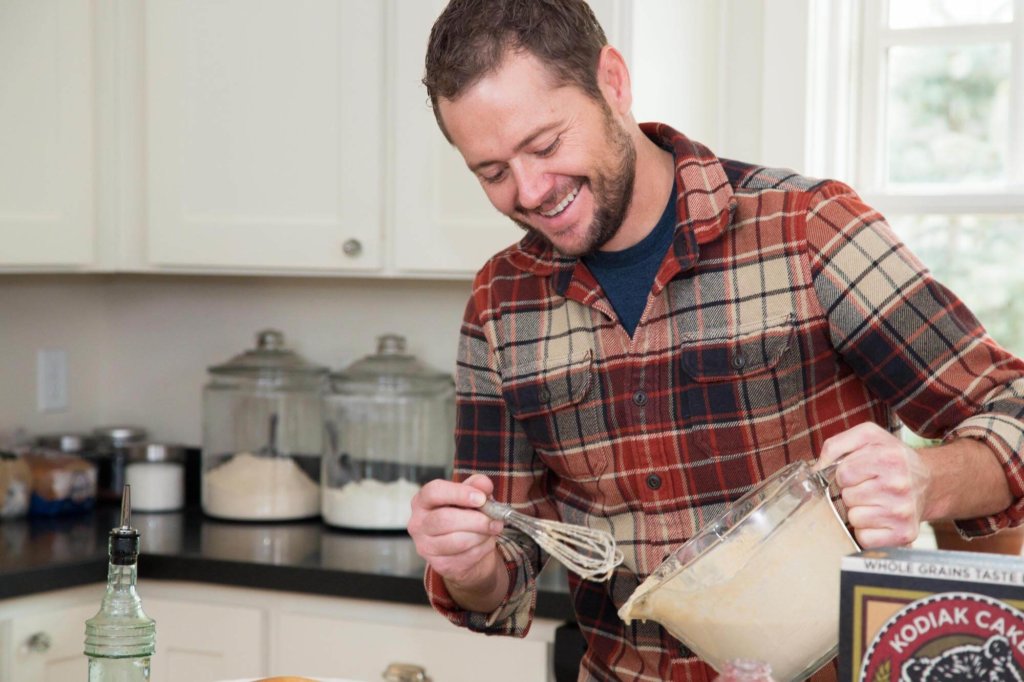The story of Joel Clark and Kodiak Cakes is a story of perseverance.
From the age of eight, Joel was knocking on doors to sell individual bags of his mother’s all-natural, healthy pancake batter. As he grew older, he dreamt of his side business becoming a success. It would take many years of hard work to achieve his goal.
His tenacity extended far beyond the point where many others would have given up. Joel cites the unconditional support of his wife and an unwavering belief in his product as his motivation.
Eventually, consumers started to pay attention. In the mid-2000s, Joel’s father helped him formalise the business. In a favourable turn of events, this coincided with a developing trend towards whole foods.
2014 was a year of incredible growth – Kodiak Cakes reached $6.7 million in sales thanks to an appearance on the television series Shark Tank combined with the success of their new high-protein product, Power Cakes.
Soon after, Joel Clark took the unusual step of offering employees equity in the company. Where some fear the dilution of ownership, he believes there is strength in numbers and sees the value of incentivising success.
Recently, Tharawat Magazine had the opportunity to talk to Joel Clark about modest beginnings, transformative growth and the benefits of employee ownership.
Kodiak Cakes began as a single entrepreneur with a singular product. Can you tell us how it all came about?
In practice, Kodiak Cakes goes back to 1982 when I was eight years old. My mum wanted to sell her pancake recipe, so she started making little homemade lunch sacks full of pancake ingredients. She attached a hand-written recipe to each bag. We loaded up my red wagon, and I went around the neighbourhood selling this mix.
My mum was a natural-foods pioneer. Everything at that time was processed or refined, but mum knew the benefit of whole grains and healthy foods. She ground her own wheat and used it in this pancake recipe that we loved.
When did your family first see the potential for growth?
In the mid-90s, my older brother Jon was looking to start a business, and my mum said, ‘Why don’t you do something with the pancakes?’ He loved the idea – he was into healthy eating and fitness and believed others with similar passions would share his enthusiasm.
Jon created the brand Kodiak Cakes and asked if I could help him sell it. We started in ski towns where tourists frequent gift shops. We entered the market in Park City, Utah, where we’re now based. Soon after, we began selling pancake mix in Sun Valley, Idaho, and Jackson, Wyoming.
An incredible amount of moonlighting kept Kodiak Cakes afloat – Jon worked another job by day and ran our business by night. At the end of 1997, he came to me and said he wanted to leave the company and go back to graduate school to get an MBA.
At 23, I took on Kodiak Cakes. It wasn’t long before I realised the immensity of the task Jon had left me. Taking his example, I managed the business on the side, at night, for about seven years while acquiring my MBA. Then finally, in 2004, I quit my other job and dove into Kodiak Cakes full-time.
“Occasionally, I received letters from our customers saying, ‘This is the best pancake mix I’ve ever had’…That, along with the unwavering support of my family, kept me going.”
Did you ever come close to giving up?
We’ve always been emotionally attached to the business, and that can be both good and bad. Attachment means you run the risk of losing objectivity. It might cause you to persevere even when it’s not going to work.
I was very conscious of this pitfall, but my mum was always supportive. She believed in it and was pragmatic in her belief. She knew there was a niche market for this product.
My wife was instrumental in keeping me motivated. If she had said, ‘Joel, you’ve got to quit chasing this dream and go get a real job,’ I would have done that. Luckily, she kept believing in it too.
Still, I came close to quitting countless times. I was afraid of failing as an entrepreneur, becoming a middle-aged man with nothing to show for his decades of hard work and dreams.
Occasionally, I received letters from our customers saying, ‘This is the best pancake mix I’ve ever had and, by the way, I love that it’s healthy.’ That, along with the unwavering support of my family, kept me going.
Today Kodiak Cakes is branded as part of a broader food revolution. When did your business become a part of something much larger?
Honestly, it took a long time. In the beginning, we knew we were different but weren’t necessarily validated by anything other than that self-belief. We were selling something substantial. Every comparable product was just full of junk; empty calories, refined white flour and sugar.
From the beginning, we saw Kodiak Cakes as part of a wider trend towards healthy eating, but for the longest time, the market was not in our favour. It took us 15 years to hit a million dollars in revenue if you can believe it.
2014 was a year of unprecedented growth. We appeared on Shark Tank, which generated a lot of exposure for us as a brand. Then, two months after that show aired, we launched Power Cakes, a high-protein pancake mix. This was a market first – a mainstream food product with added protein – and it took off.
Many people who were not buying pancake mix in the past started buying Power Cakes because of the protein. In this way, we grew our consumer base.
How has the trend towards healthy eating and organic food contributed to your sales over the past five years?
It’s been immensely beneficial. We had a great-tasting product, but that wasn’t enough to revolutionise the category. Food awareness has driven our growth because those that embrace healthy eating are also willing to pay more to do so.
Social media has played a crucial role as well. I have two teenage daughters. They follow various food-related Instagram accounts, and they’re constantly reading about why you should eat whole grains. I grew up in a home with healthy food, but we never had that level of awareness. Access to information is the driver behind this whole food revolution.
Taking on private equity is an uncommon direction in family business. What inspired that decision and what adjustments did you need to make?
Through 2014 and 2015, we grew exponentially. In 2016, we brought in a private equity partner as a means to secure additional capital. We had recently assembled a board of directors, and we had to build a professional management team.
I had to grow personally and transition from the role of a small business owner to CEO. We had scaled to the point where I started thinking about culture, which has become one of our success stories. We have a strong culture here at Kodiak Cakes, a prerequisite for long-term growth.
Since the transition, my focus has shifted such that I’m less concerned with hands-on, day-to-day management of things and more focused on people.
[ms-protect-content id=”4069,4129″]
Did this process factor into your decision to move away from family ownership?
In the beginning, we did have this dream of keeping the family business forever and passing it down to our kids. As the years went on, however, I became aware of the complications that can arise when family becomes more involved.
I also realised that I needed more talent. I knew we needed to grow quickly because of the competition. So, while we do have a lot of family members involved in terms of ownership, they aren’t involved in the day-to-day anymore.
Why did you decide to offer employee equity?
It was always my dream to be able to give employees some equity. Some people say that if you offer equity, there will be pressure from your employees to sell the company. However, I’ve experienced the opposite. Our employees recognise that we’re building a great culture, we’re seeing the success, and they are asking me not to sell it too soon because this is way too much fun.
Others caution that offering equity means you have to worry about transparency. We’ve always believed in openness. Information is motivation, so our transparency translates into more purposeful work.
If an employee is working merely to collect a paycheque, then that’s the wrong kind of employee. The only reason Kodiak Cakes is successful is because of its amazing people.
How do I keep these people? I need to keep them excited. My theory is that if I offer them a piece of the business, then the business will grow larger than it would have had I not done that.
You’ve been doing this since you were eight years old. Can you envision a day when you’re no longer selling Kodiak Cakes?
I’m 44 right now. In 20 years, I’ll be 64. I’m not sure I have the stamina to keep going that long.
We want to keep scaling up, but I foresee a time when I begin to question the necessity of our expansion, or at least my role in it. Right now, though, it’s pretty fun.
I enjoy helping people gain experiences and opportunities in their careers and watching them develop. If I ever do leave Kodiak Cakes, the most difficult part will be leaving those I care about – the people who have given everything for me and for this company.
[/ms-protect-content]

